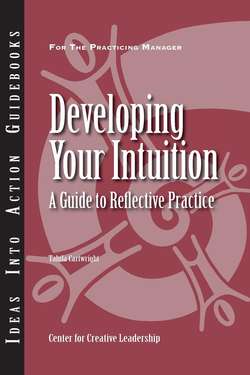Читать книгу Developing Your Intuition: A Guide to Reflective Practice - Talula Cartwright - Страница 8
На сайте Литреса книга снята с продажи.
ОглавлениеIntuition and Reflection
In the world of work, leaders often find themselves in the position of having to make decisions without complete information. They’re expected to make decisions that are not only right but also timely. Strategic and tactical choices can’t always wait, so effective leaders learn to depend on their intuition as well as the evidence of the moment to reach decisions quickly with minimal information. Without the confidence to trust their intuition, less effective managers may analyze too long, second-guess their decisions, or change course midstream.
As a rule, Westerners value the ability to make quick decisions and don’t put as much stock in processes that are deliberate, slow, and reflective. But there’s a paradox in that view. The process of slowing down and reflecting, deliberately and conscientiously, actually helps us to build our confidence in using intuition—to trust that gut instinct that enables us to make quick decisions that have a good chance of being correct.
Leaders often question their intuition. They wonder whether they use it enough, whether they can trust it, whether they have it at all. After all, they are often rewarded for their analytical skills and rationalistic approaches. But there are tools and techniques available to help managers understand that they have alternative ways of thinking about problems. Some of these reflective techniques may be unfamiliar to you, which may make it hard to practice and finally adopt them. A certain amount of skepticism is to be expected, but a willful resistance to alternative problem-solving methods (like the ones explained in this guidebook) only reduces the creative resources necessary for innovation and quick action. Managers who are open-minded about using these reflective practices can boost their confidence in their intuitive thinking. They can learn to trust their instincts when critical situations demand quick decisions and when complex problems defy easy answers.
Lonely at the Top
Ironically, the higher up in the organization a manager is and the more complex and critical decisions become, the more useful and necessary intuition is. At the top of organizations, leaders can find themselves isolated from information channels while at the same time they are challenged with complex problems. In its work with thousands of executives, CCL’s experience has been that leaders at the top have a stronger preference for using their intuition than do leaders at lower levels.
